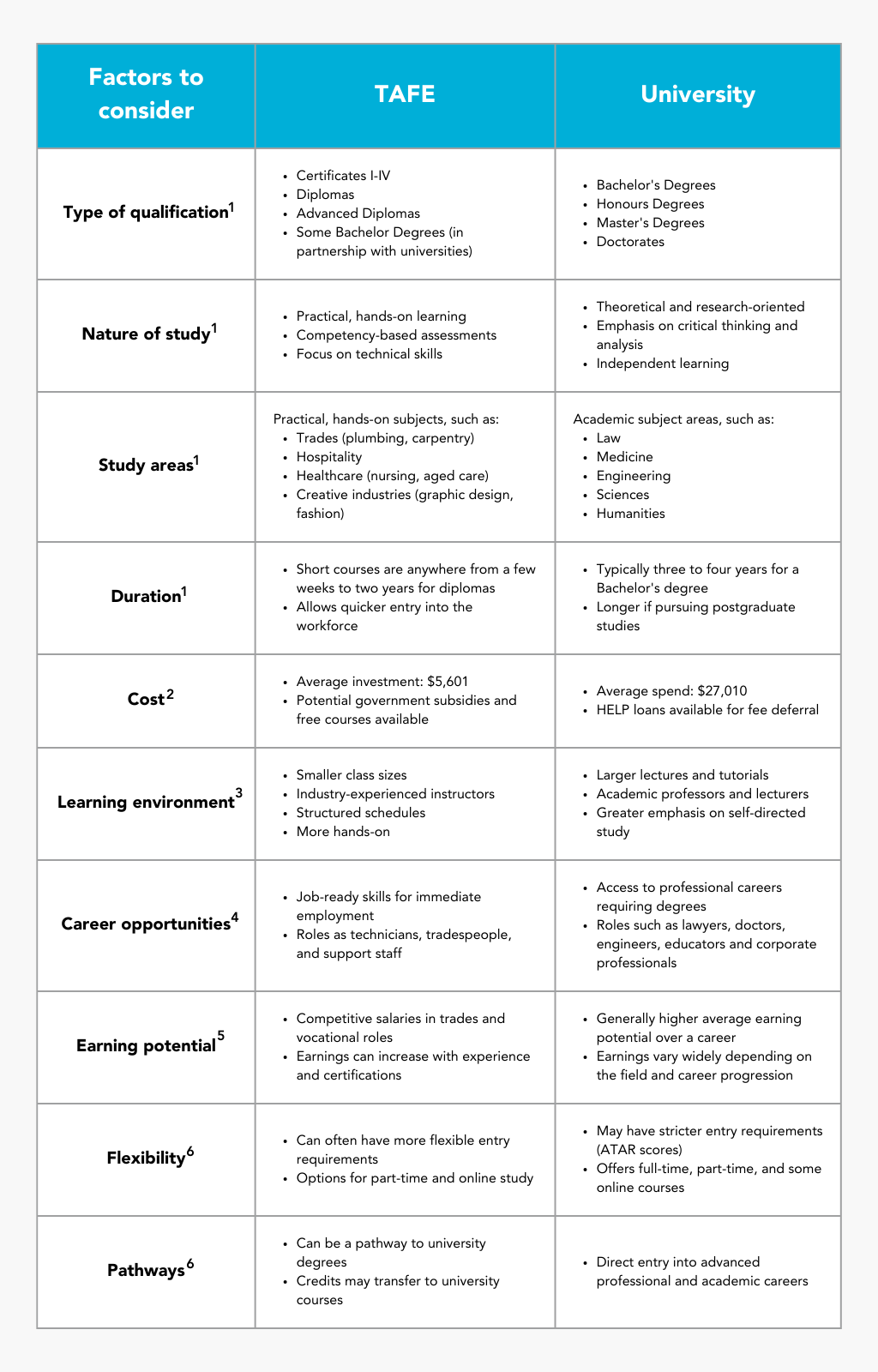TAFE vs University: The great education debate

Deciding between TAFE and university (or uni) is a big decision that can shape your career and future opportunities. Whether you're an adult thinking about further education or a parent helping your teen navigate their options, understanding the differences between TAFE and university can ultimately affect the decision.
Both tertiary education options can offer unique advantages and cater to different learning styles and career goals.
In this guide, we'll dive into what TAFE and university are all about, compare their costs, and break down the key differences to consider when deciding which tertiary education pathway could be right for you.
What is TAFE?
TAFE is Australia's largest provider of vocational education and training (VET). TAFE institutions offer a wide range of TAFE courses designed to give you practical skills and training for specific industries.
Whether you're interested in becoming a chef, electrician, or graphic designer, TAFE can offer hands-on learning experiences that prepare you for the workforce.
What does TAFE stand for?
TAFE stands for Technical and Further Education. It focuses on delivering technical education and helping students further their practical skills and knowledge beyond secondary school.
Is TAFE a tertiary qualification?
Yes, TAFE is considered a form of tertiary education in Australia. Tertiary education includes all post-secondary education — meaning anything after high school — including both higher education (like universities) and vocational education and training (like TAFE and private colleges).
TAFE offers nationally recognised qualifications ranging from Certificates I-IV to Diplomas and Advanced Diplomas. Once completed, these TAFE qualifications can ultimately provide you with practical skills for specific trades and professions.
What is university?
Universities in Australia are institutions that offer undergraduate and postgraduate degrees across a multitude of academic disciplines. University is a form of tertiary education in Australia, offering higher education degrees across various disciplines.
University education is often research-oriented and theory-based, fostering critical thinking, analytical skills, and in-depth knowledge in a particular field of study. Degrees range from bachelor's degrees to master's and doctoral levels, preparing students for professional careers or further academic pursuits.
Counting the costs of tertiary education: TAFE fees vs university fees
It's important to understand the potential financial impacts of your education choice. Recent findings from the Choosi Cost of Career Report 2024 shed light on the true costs of tertiary education in Australia.
How much does university cost in Australia?
It's no surprise that pursuing tertiary education comes with a price tag. According to the Choosi report, university students spend an average of $27,010 to secure their degree — that's the same price as an entry-level car or even a deposit on a home worth around $500,000.
Almost 2 in 4 take out a HECS or HELP loan for their education.
If you're shocked by that cost, you're not alone. Almost half (47%) of students who have taken out a HECS or HELP loan are seriously concerned about being able to repay it.
Plus, more than half (56%) feel their HECS or HELP debt will hurt their chances of owning a home, causing over a quarter (29%) to cut back on things like travel.
How much does TAFE cost?
If you're considering TAFE, you're looking at an average investment of $5,601, according to the Choosi report. While it's generally lower than university fees, TAFE fees can still be a significant expense for many Australians.
Is TAFE free?
TAFE is not universally free. However, some government-funded programs can significantly reduce or wave tuition fees for specific courses and eligible students. For instance, the Australian Government's Fee-Free TAFE initiative aims to support vocational education and training in high-demand sectors, such as aged care, early childhood education, and manufacturing.
It's a good idea to check with your local TAFE institution or state education department for the most up-to-date information on what subsidies and free courses may be available.
TAFE vs university: breaking down the key differences
Choosing between TAFE and university involves comparing several factors, including the type of qualification, study areas, career opportunities, and potential earning capacity. Here are some key differences to consider.

In summary, the key differences between uni and TAFE lie in the nature of the education provided:
- TAFE focuses on vocational training with an emphasis on practical skills and direct industry application. Completing a TAFE qualification can lead to immediate employment opportunities.
- University is focused on academic education, developing theoretical knowledge and critical thinking skills. Earning a bachelor's degree can open doors to professional, white-collar careers in industries like medicine or law.
Is TAFE better than uni?
The question isn't whether TAFE is better than university, but rather which one is better suited to your personal goals and circumstances. TAFE may be preferable if you want to gain practical skills quickly, prefer hands-on learning over theoretical study, and want to enter a trade or vocational profession.
University might be the better choice if you are interested in a career that requires a bachelor's degree or higher, if you enjoy theoretical learning and academic research, or plan to pursue postgraduate studies, such as graduate diplomas or master's degrees.
TAFE vs uni: Making the right choice
When considering TAFE or university, reflect on your career aspirations, learning preferences, and the type of work you find fulfilling. Research the industries you're interested in to understand the qualifications required and the potential career paths each has to offer. Resources like the University Admissions Centre and Study Australia can provide valuable insights.
Keep Reading: Learn more about the financial and emotional costs involved with taking on further study and entering the workforce.
Remember, education is an investment in your future. Whether you're considering TAFE or uni, the most important factor is selecting a path that suits your interests, strengths, and career ambitions.
Just like choosing the right education path, it's also important to consider planning for your financial future. By comparing a range of life insurance options with Choosi, you can financially protect you and your loved ones, giving you peace of mind as you embark on your new career journey. Request a quote and compare a range of policies online today.
Table reference list:
² Choosi Cost of Career Report 2024
⁴ TAFE Edge
8 Jan 2025
